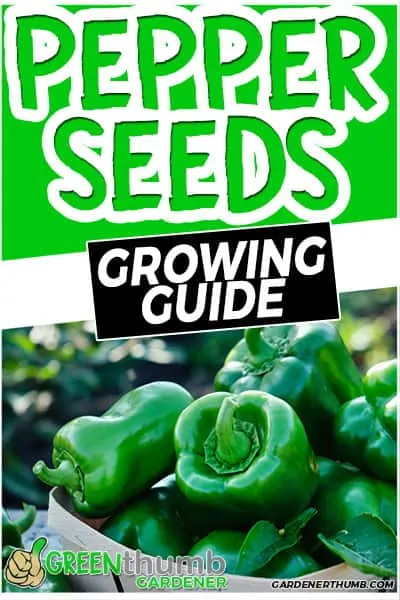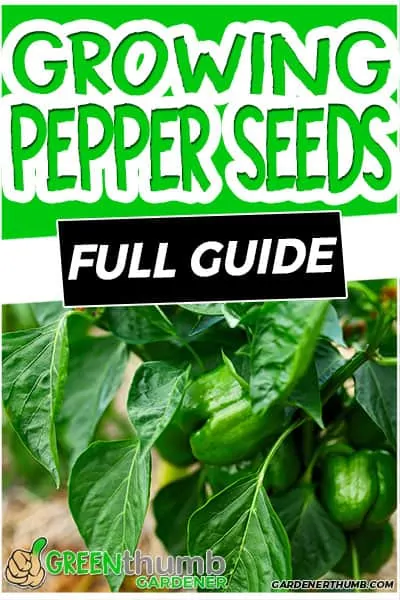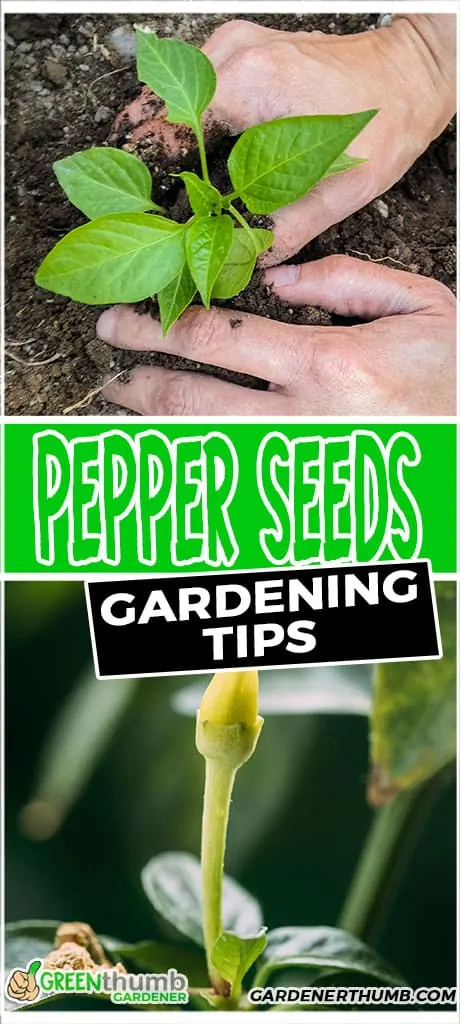How Long for Pepper Seeds to Germinate
Last updated: 9/21/20
Growing pepper myself was something I looked forward to. Of course, I wondered how long for pepper seeds to germinate.
So, after some research, here’s what I found. Within the right conditions such as good drainage, proper light, and enough warmth, your seeds should take between 8 and 21 days. However, this will depend on the type of pepper as some variety, such as the Chinese, will take four weeks plus.
Well, that’s not all. Let’s dig in.
Green thumb Gardener occasionally links to product and/or services offered by vendors to assist you with all your gardening needs. Some of these may be affiliate links, meaning we earn a small commission if items are purchased.
Want to Download a Garden Hack Guide for FREE

Enter your email below and we will send you a guide to help you SAVE money in your garden.
Before You Get Started Germinating Pepper Seeds
Just before you get planting, you’ll need to have loads of things in mind. And these are quite important if you want to get the best results.
The thing is that I tried germinating without this information. Then, I tried using this information. All I can say is that I got a better result with this information.
So, looking to jump in on this? Here you go!
Easiest Pepper to Grow
There’s a wide range of pepper variety that you can cultivate. However, each type comes with its stress. So you might just be thinking which sort brings the most ease.
Well, the Capsicum Annuum’ variety is relatively easy to grow. As such, you’ll find its options such as Hatch, poblano, Thai peppers, and Anaheim as easy alternatives to germinate.
Soaking
Now, you’ve chosen your seeds. Next, you’ll think of planting them and waiting for them to germinate.
However, just before that, it’s a good idea to soak your seeds. From my experience, I find the seeds that I soak doing better than the ones I didn’t soak.

So, get a bowl of warm water and allow your pepper seeds 24 hours inside. And remember to plant your seeds as soon as it’s out.
6 Tips for Pepper Seed Germination
You’ll need to pay great attention when planting your pepper seeds. And this is because it can be quite tricky to get it through the germination stage.
Well, I’ve been there and found some things quite useful. For you to have a great experience, here are some tips for pepper seed germination.
Use Light Soil Mixture
One of the first things you’ll need to have in mind is your soil mixture. And this isn’t too hard to monitor when you consider that you do your plantings indoors. So, you’ll just have to take advantage of this to give your pepper the best soil quality possible.
And this means light and friable soil. This is because a lightweight and soilless medium will ensure that there’s good drainage.
However, you might just want to ensure that your soil contains vermiculite or perlite for the best effects. This will ensure that your seed can get enough oxygen.
Plenty of Moisture
Like most plants, water and moisture is an essential element of your seed growth. And this is even more important when it comes to pepper seeds.
This is because pepper seeds have a thick seed shell or coating. As such, it can be quite hard for it to absorb water.
So, it’s simple. You’ll need to ensure there’s enough water that can break through the seeds and begin the germination process. So, you might want to use our soaking tip above before you start.
Then, you can also reduce evaporation to the barest minimum. All you’ll need to do is cover your container using a plastic wrap. And then keep it away from direct sunlight until germination. This way, there’s enough water to go round.
Ensure Warm Temperature
Your soil temperature is another thing you’ll need to pay close attention to it. You must already know by now that temperature is critical when it comes to germination.
For instance, you need your seeds within 60 to 90 degrees Fahrenheit to germinate properly. You can even increase your germination speed by increasing the temperature to around 85 degrees Fahrenheit.
All you’ll need to get is a seed heating mat. With it, you can modify your soil temperature. And then ensure your peppers get the best possible temperature.
However, remember that seed heating mats aren’t always a choice. You’ll need to get it as soon as your temperature falls below 55 degrees Fahrenheit. Otherwise, your seeds won’t germinate.
Use Fresh and Viable Seeds
So, I once used some seeds I found stored away, hoping to germinate them. Unfortunately, they never grew. I wasn’t even surprised as I have no idea how long the seeds had been in storage for.
But one thing I learned was that you need fresh and viable seeds to get proper germination. Anything less than this will be a futile effort.
So, your best bet will be to purchase new seed. And when you do and don’t plant immediately, you’ll need to store them properly.
So, keep them in a location that has a temperature within 32 to 41 degrees Fahrenheit. You might want to use a refrigerator too.
It would help if you also remembered only to make purchases from a reputable garden center. This way, you know you’re getting good seeds.
Early Planting
You already know that your pepper needs a warm temperature for the best growth. So, you’ll need to apply this idea to all your planting.
One thing that you’ll keep in mind is starting your planting early. It would be best to begin some 6 or 8 weeks before the final frost date. And, indoors, of course.
This way, you can maintain the necessary temperature. You’ll also need to keep them warm at night. You might need a seed heating mat for this.
Pinch Your First Blossoms
You’ll need to prune your plants immediately after your first blossom. And this is because it provides strength to the growth.
The idea is simple. You’ll pinch off your first blossoms. This will then encourage your pepper seedlings to divert its energy to growing more robust foliage and roots. In turn, this will ensure that your plant produces more peppers.
Avoid These When Germinating Pepper Seeds
When germinating pepper seeds, I keep asking myself what I should do. However, with time I realized it wasn’t just what I did. It was also about what I didn’t do.
So, when germinating pepper seeds, you’ll need to avoid some things too. Don’t worry, I’ve got it all detailed out. Here you go.
Avoid Overwatering
Yes, I’ve told you to keep your seeds and soil moist. However, this doesn’t mean you should drown your seeds in water. As much as your peppers need water, soggy roots are a no go area for them.

As such, you need to ensure your soil never gets all soggy. You might want to use pots with proper drainage. They’ll help you keep your soil within the required moisture level.
Avoid Over Fertilizing with Nitrogen
I’ve always felt I needed to boost my plant with fertilizers. Yes, it’s a great idea.
However, when it comes to pepper, you’ll want to avoid overdoing it. This is because your peppers are very light feeders.
As such, while a regular supply of compost tea or organic fertilizers is an excellent idea, nitrogen fertilizers aren’t.
Yes, you can always add homemade compost to your garden each year. However, that doesn’t mean they have to be nitrogen ridden. The fact is that nitrogen will start lush foliage and only a few peppers.
So, avoid nitrogen like the plague.
Don’t Rush It
Your pepper seeds require you to exercise patience when it comes to germination. You don’t want to rush things and start acting based on these urges.
So, ensure that you keep cool when planting. Your seeds have different germination times. And you’ll need to keep this in mind where you’re growing more than one variety. Don’t worry; we’ll get to seeds germination time later on.
Average Germination Times for Some Common Peppers
When I started with pepper seeds, I felt so lost. And this was due to the irregular germination time that I faced.
There were times when I felt like I was doing something wrong. It turns out with pepper seeds; each species has a different germination time.
So, here’s what you need to know.
Chinese Peppers
Chinese peppers are quite popular. Usually, it needs warm and non-acidic soil to germinate properly.
Some peppers which fall under this category include Naga Morich and Bhut Jolokia. These categories are relatively slow when it comes to germination. They might take within 1 to 4 months to germinate.
Sweet Peppers
Your sweet peppers will take between 7 and 21 days to germinate. And this makes them fast-growing.
Chili Peppers
Your chili peppers take a while longer than your sweet peppers, although shorter than the Chinese species. Typically, they’ll take between 14 and 40 days for your chili peppers to germinate.

Final Thoughts
While you’ve got your seed germination time on your mind, that’s not all you’ll need to be worried about.
You’ll have to know what to do, what to avoid, and best practices to maintain. I’ve detailed all that for you in this post.
So, keep them in mind and have fun growing.
Related Questions
What Is the Fastest Way to Germinate Pepper Seeds?
For the best effect, place your seeds inside damp paper towels and place then in a zip bag. Then, place the bag on a warm surface, such as on top of a refrigerator, then transfer the seeds to individual containers after sprouting.
Do Pepper Seeds Need Light to Germinate?
Yes, pepper seeds require light and well-drained soil for it to germinate. But, the light here doesn’t mean sunlight, as you’ll need to keep your pepper seeds away from direct sunlight.
How Do You Germinate Pepper Seeds Indoor?
To germinate, sow your seeds ¼ inch deep into a sterile mixture that’s moist. Then, add water daily to keep it moist and keep the soil the temperature within 75 to 80 degrees Fahrenheit.








